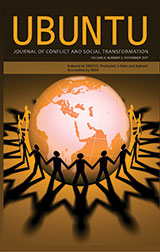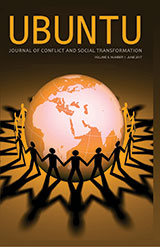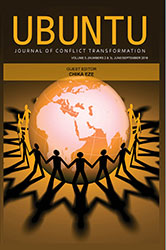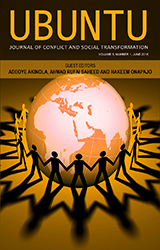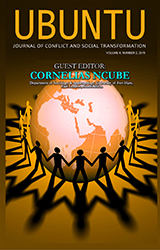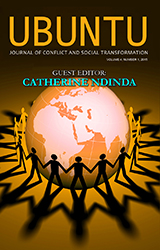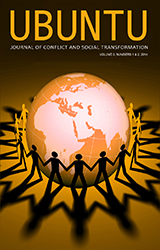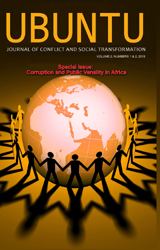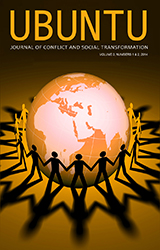
 editor@adonis-abbey.com
editor@adonis-abbey.com ![]() UK: 0207 795 8187 / Nigeria:+234 705 807 8841
UK: 0207 795 8187 / Nigeria:+234 705 807 8841
Journal Categories
- JOURNALS
- AFRICAN JOURNAL OF PEACE AND CONFLICT STUDIES ISSN 2634-3657 E-ISSN 2634-3665 FORMERLY UBUNTU: JOURNAL OF CONFLICT AND SOCIAL TRANSFORMATION ISSN: 2078-760X E-ISSN: 2050-4950
- EDITORIAL BOARD
- EDITORIAL GUIDELINE
- REVIEW PROCESS
- PUBLISHING ETHICS STATEMENT
- SUBSCRIPTION
- SEARCH JOURNALS
- LATEST NEWS
- CALL FOR PAPERS
- SUBSCRIBE FOR NEWSLETTER
- UNSUBSCRIBE FOR NEWSLETTER

Adonis-Abbey's Journal Section
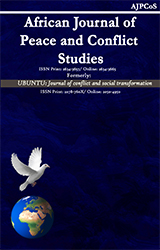
African Journal of Peace and Conflict Studies ISSN 2634-3657 E-ISSN 2634-3665 formerly Ubuntu: Journal of Conflict and Social Transformation ISSN: 2078-760X E-ISSN: 2050-4950
Publication Frequency: Tri-annually. ISSN 2634-3657 E-ISSN 2634-3665
Ubuntu Journal of Conflict and Social Transformation Volume 5, (Numbers 2 & 3) June/September 2016 Guest Editor Chika Eze
At the heart of Ubuntu: Journal of Conflict and Social Transformation is the promotion of humaneness, which broadly promotes our common humanity and idea of kindness towards others. Hence, the modern notion of human rights can be subsumed, though arguably, within the idea of Ubuntu. Human rights are rights to which everyone is inherently entitled to (APA, 2016). Globally, December 10th has been designated as Human Rights’ Day. The day is used to remind and make loud calls on governments and all stakeholders to respect the socio-political and economic rights of others. One of the core values for maintaining humanness in the context of interpersonal relationships is the recognition that our shared values and collective humanity do not obviate individual differences. Aptly, Ubuntu demands solidarity which respects the other; thus, the violation of human rights is an abuse which triggers stress in every sense of it. Accordingly, the four articles on offer and personal reflections ............
Ubuntu Volume 4, Number 2, 2015: Journal of Conflict and Social Transformation
Freedom Mazwi and Rangarirai Muchetu explore the exploitative emergent agrarian relations in the sugarcane plantation estates in eastern Zimbabwe following the fast tracked state-driven land reform program in 2000. Zimbabwe’s initial violent land reform program and the resultant uncertainties over land tenure security and political instability saw a number of banks suspending agriculture financing to the beneficiaries of land redistribution. Fifteen years later, the financial institutions are slowly re-financing agricultural production, albeit not directly to peasant farmers but through large plantation estates. These contract farming arrangements that are emerging away from state policy spaces in the agriculture sector, Mazwi and Muchetu argue, are promoting exploitative asymmetrical relations between the monopolistic and powerful plantation estates and the poor sugarcane small to medium farmers whose net incomes are being reduced through unfair pricing structure and high ............
Ubuntu: Journal of Conflict and Social Transformation Volume 4, Number 1, 2015
Ubuntu: Journal of Conflict and Social Transformation seeks to advance knowledge and understanding of the notion of Ubuntu which speaks to the idea of humanness. The first half of 2015 jolted African scholars, politicians, the clergy and leaders from all walks of life to stand and be counted among those against the sort of inhumanness that we sometimes observe Africans meting out on fellow Africans. In April of 2015, close to 150 students of Garissa University in Kenya were massacred by Al Shabab terrorists. The ringleader of the atrocious attack was a law graduate. The terror attack on Garissa University Students was no different from previous attacks in Kenya where non-Muslims were singled out for execution. Though based in Somalia, Al Shabab recruits young sympathisers from the mainly Muslim communities in Kenya. With terrorist groups like Al Shabab and Boko Haram butchering civilians in cold blood, the question on every right thinking African is: “where then is our humanness&............
Territoriality, Citizenship and Peacebuilding: Perspectives on Challenges to Sustainable Peace in Africa special inaugural issue, UBUNTU, (Vol. 1 Nos 1-2, 2012)
For generations going back to ancient times, scholars and other interested parties have debated the causes of conflict and war. Conflicts and wars have become a major preoccupation of humans – from individuals to leaders, communities, and whole countries. Not surprisingly, scholarly explanations and theories now abound. For some scholars, conflicts and wars can be attributed to psychological factors, particularly the roles played by leaders and other key players. For many social psychologists and sociologists, the answer may be found by looking at the sorts of roles people play within social groups in society. Many anthropologists blame conflicts and wars on the cultural factors which condition human beings to particular behaviour patterns. Many scientists attribute conflicts and wars to human nature, suggesting that human beings – particularly males – are effectively coded genetically to engage in aggression as a survival mechanism in a world full o............
To subscribe to any of the journals, Please Email Us.



